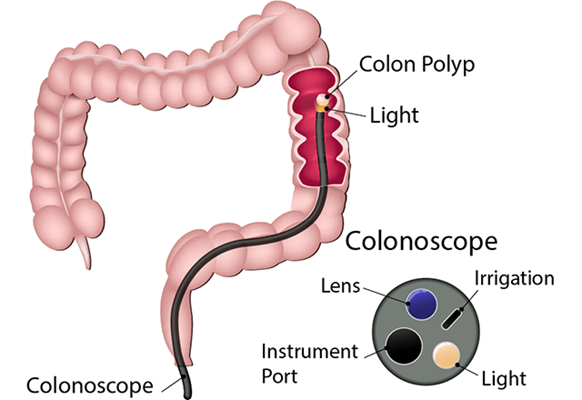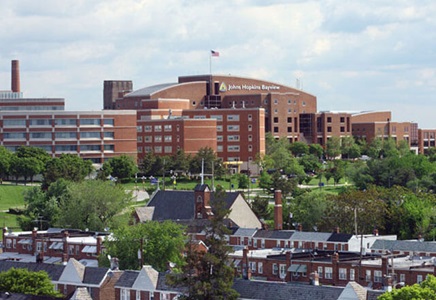When Can You Drive Again After a Colonoscopy
Colonoscopy
A colonoscopy is a process that lets your health care provider check the inside of your entire colon (large intestine).
The procedure is done using a long, flexible tube called a colonoscope. The tube has a low-cal and a tiny camera on one end. It is put in your rectum and moved into your colon.
In improver to letting your provider see the within of your colon, the tube can be used to:
- Clean the lining of your colon using irrigation (a water jet)
- Remove any liquid stool with a suction device
- Inject air into your bowel to get in easier to come across inside
- Work inside your bowel with surgical tools
During a colonoscopy, your provider may remove tissue or polyps (aberrant growths) for further examination. He or she may also exist able to treat problems that are constitute.
Anatomy of the Colon
The colon is the concluding section of your digestive system. Information technology absorbs water to alter waste from liquid to solid stool. The large intestine is nigh five feet long in adults. It has the following four sections:
- Ascending colon: extends upward on the correct side of your belly
- Transverse colon: extends from the ascending colon across your body to the left side
- Descending colon: extends from the transverse colon downwards on your left side
- Sigmoid colon: extends from the descending colon to your rectum
The rectum joins the anus, which is the opening where stool passes out of your trunk.

Why might I demand a colonoscopy?
Colonoscopy tin can help your provider wait for problems in your colon. These include whatever early signs of cancer, inflamed (red or bloated) tissue, ulcers (open sores) and bleeding.
Cancer Screening
Colonoscopy is too used to screen for colon cancer and rectal cancer. Screening involves looking for cancer in individuals who do non have any symptoms of the illness.
Colonoscopy can too exist used to check the colon after cancer handling.
Checking and Treating Problems
A colonoscopy may exist used to cheque and, if needed, treat bug such every bit:
- Colon polyps
- Tumors
- Ulcerations
- Inflammation
- Diverticula (pouches) along the colon wall
- Narrowed areas (strictures) of the colon
- Whatever objects that might be in the colon
It may also be used to notice the crusade of unexplained, chronic (long-term) diarrhea or haemorrhage in the gastrointestinal (GI) tract.
Results of Other Tests
Colonoscopy may be used when other tests show the need for additional testing. These include the post-obit:
- Barium enema
- Computed tomography (CT) colonography (also called virtual colonoscopy)
- Tests for blood in the stool
- Stool Dna tests
- Sigmoidoscopy
Your health care provider may have other reasons to recommend a colonoscopy.

Find a Location
What are the risks of a colonoscopy?
As with any invasive procedure, complications may occur. Complications related to colonoscopy include, merely are non limited to, the following:
- Connected haemorrhage after biopsy (tissue sample) or polyp removal
- Nausea, vomiting, bloating or rectal irritation acquired by the procedure or by the preparatory bowel cleansing
- A bad reaction to the pain medicine or the sedative (medicine used to provide a relaxing, calming effect)
- A perforation (hole) in the intestinal wall, which is a rare complication
Yous may have other risks related to your condition. Be sure to discuss any concerns with your provider before the procedure.
How do I get fix for a colonoscopy?
Your health care provider will fully explicate the procedure and answer your questions. You will be asked to sign a consent form prior to the test. Read the form advisedly and ask whatsoever questions you may accept.
Dietary Instructions
Y'all must non swallow or drink for a specified corporeality of time before the procedure. This ofttimes means no food or drink subsequently midnight or a restricted schedule with the laxative and water sips allowed until a couple hours earlier the colonoscopy. Yous may be given boosted instructions about a special diet to follow for one or 2 days earlier the procedure. Information technology is absolutely mandatory to follow your particular instructions carefully to avoid cancellation and to ensure a rubber, effective test.
Notifications for Your Doctor
Before your colonoscopy, tell your provider:
- If you are sensitive or allergic to any medicines, latex, tape oranesthesia medicines (local and full general)
- About all the medicines you take, including over-the-counter drugs, prescription medicines, vitamins, herbs and other supplements
- If y'all have a history of haemorrhage disorders
- If you are pregnant or remember yous may be pregnant
Bowel Preparation
Your health care provider will give y'all instructions on how to prepare your bowel for the test. You may be asked to take a laxative, an enema or a rectal laxative suppository. Or you may have to drink a special fluid that helps clean out your colon.
Medications Before and Subsequently the Procedure
If you are taking whatever blood-thinning medicines, aspirin, ibuprofen or other medicines that affect blood clotting, they may need to be stopped earlier the procedure. If you have a heart valve disease, yous may be given disease-fighting antibiotics before the process.
Prior to the procedure, you will be given pain medicine and a allaying. Subsequently the procedure, someone must drive you habitation.
The Importance of Good Bowel Training During Colonoscopy
In this video, learn why the bowel grooming for a colonoscopy is and then important to the results of the procedure.
What happens during a colonoscopy?
You may take a colonoscopy in an outpatient setting or as part of your stay in a hospital. The way the test is done may vary depending on your status and your health care provider's practices.
Generally, the colonoscopy follows this process:
- You lot will be asked to remove whatever jewelry or other objects that mightget in the manner during the procedure.
- Y'all may exist asked to remove your clothing and put on a hospital gown.
- An intravenous (Iv) line will be inserted into your arm or hand. A sedative or a pain medicine will be injected into the IV.
- You volition be given oxygen to breathe.
- Your eye rate, blood force per unit area, respiratory rate and oxygen level will exist checked during the process.
- You will exist asked to lie on your left side with your knees pulled upwardly towards your breast.
- A lubricated tube will be put into your anus and moved into your rectum and colon. You may feel balmy pain, force per unit area or cramping during the procedure. A sedative is used to reduce your discomfort.
- Depending on the type of anesthesia used, you lot may be completely asleep during the process. If awake, you lot may be asked to take slow, deep breaths while the tube is being inserted. This helps to relax your abdominal muscles and decrease the discomfort. You may also be asked to modify your position to aid the tube pass through.
- Air may be injected into your bowel. This may brand information technology easier to run into the inside surfaces. A water jet may as well be used to make clean the lining of your colon. A suction device may exist used to remove any liquid stool.
- The health care provider will check your colon and may take photos. If a polyp is seen, it may be taken out. Or it may be left in the colon until a future procedure is performed.
- Afterward the process is over, the tube will be taken out.

Need to acquire more near colorectal cancer?
Our squad is defended to developing multidisciplinary treatment plans for complicated, advanced colon and rectal cancers.
What happens subsequently a colonoscopy?
Afterwards the procedure, you will be taken to the recovery room to be monitored. Your recovery procedure volition depend on the type of sedative you were given. In one case your blood pressure, pulse and breathing are stable and you are awake and alert, you will exist taken to your hospital room. Or you lot may be discharged to your home.
You can usually eat whatever you tin can tolerate after the procedure. Some people commencement with small, bland meals.
Information technology is normal to be flatulent (pass gas) and experience gas pains later the procedure. Walking and moving effectually may help to ease any mild pain.
You should non potable alcohol for at least 24 hours. Y'all may exist asked to drink extra fluids to brand upwardly for the water you lost every bit you got gear up for the procedure.
Tell your provider if you lot feel whatsoever of the following:
- Fever or chills
- Frequent, bloody stools
- Belly hurting or swelling
- A hardened belly
- The inability to pass gas
Your wellness care provider may give you lot other instructions depending on your situation.
hedlundmicketionath.blogspot.com
Source: https://www.hopkinsmedicine.org/health/treatment-tests-and-therapies/colonoscopy
0 Response to "When Can You Drive Again After a Colonoscopy"
Post a Comment